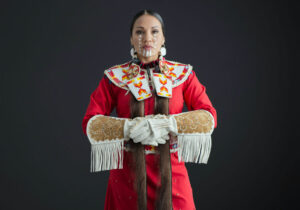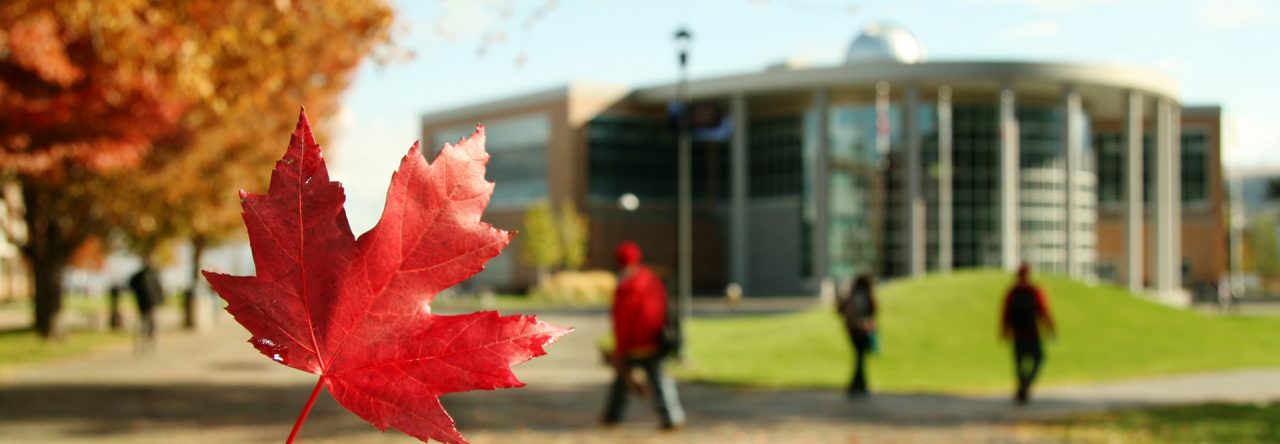
Photo credit: Maggi Woo
By Laura Grizzlypaws
Educational Developer, Indigenous Education CELT
St’át’imc | Ecw7úcwalmicw
Throughout Indigenous histories, since time immemorial, our ancestors’ lives were based on an oral cultural way of life and still is to this present day. Our Indigenous histories, lessons, life, and knowledge was passed down orally for countless generations to sustain cultures and our unique authentic identities. One of the greatest gifts that I believe I mastered was the art of storytelling through songs. The ability to sing, and to ability to compose songs that articulate and reflect the values and beliefs and even current issues we face as Indigenous peoples.
To me, singing, is a powerful tool and skill in the lives of Indigenous peoples. Singing songs is a strong part of a cultural heritage of people, family, and individuals. It embodies the spiritual relationship of the songs to the animate, inanimate, and natural phenomenon. For example, when a child was born a song was sung; when a new day came, a song was sung symbolizing the relationship of a person to the star world. When a person passed onto the spirit world, a song was sung; when a couple united in marriage, a song was sung; when the people harvested, a song was sung; and, when the people danced a song was sung. There are so many songs sung by Indigenous peoples, happy songs, love songs, wailing songs, grieving songs, ceremonial songs, prayer songs, appreciation songs, and songs sung even for the land, the earth, the air, and the water. Within Indigenous cultures, being an oral culture, songs played and continue to play a huge role influencing others of storing and sharing information knowledge and wisdom.
Around campus, in and out of the community you will hear Indigenous peoples sing songs and share the role of their songs sung. These songs shared, are shared to reinforce the collective identities of Indigenous peoples. Many songs are sung and shared by a people and even between nations. Songs sung are ways of empowering, educating, bringing people together creating awareness of Indigenous wisdom through voice. Singing songs was a way of transferring knowledge, providing support, and sharing information. Songs sung at events provide support and uplift the energy and spirit of the people and its purpose to honor past, present, and future generations.
Songs sung are sung with lyrics combined with a chant in a way that affect both emotional, social, and intellectual aspects of a listener. Indigenous people’s epistemologies are a way of honoring their connections to seven generations into the past (ancestral), current generations and seven generations into the future (including the ones not yet born). Songs appeal to a people’s minds, hearts and spirits combining all four aspects of a human’s ability mentally, physically, spiritually, and emotionally. All songs that are sung, are and or were created are based on the intellectual, emotional, and spiritual processes one’s experiences. Many songs sung using a hand drum, are old songs, that have been passed down orally for countless generations symbolizing community, family, and social responsibility to ensure the songs continue to be passed on to future generations.
However, Indigenous music continues to grow through the art of contemporary music. Most importantly the contemporary oral art of music still celebrates and honor the values and principles of sharing important knowledge, information, and education of Indigenous issues.
The song titled “Come Home,” sung by Grizzlypaws at the Indigenous Music Awards Festival recorded by powwows.com, is sung through Indigenous Languages of Canada and the United States (English, Carrier – Dakelh, Cree, Sahaptin, Nlha7kapmecw, Dine-Navajo, and St’at’imc). This is an example in which Indigenous peoples have used music to become a part of social movements based on the values and principles of their identities as Indigenous communities. This song was created and dedicated to the Missing Murdered Indigenous Women (MMIW) Come Home, Come on Home, This is the Land You Call Home, Come Home, Come on Home, This is the Land, You Should have Known Laura Grizzlypaws – 2019 Indigenous Music Awards – YouTube.

nivito
Moltes gràcies. El vostre bloc té un contingut molt agradable, emocionant. puc tornar al vostre weblog encara!,